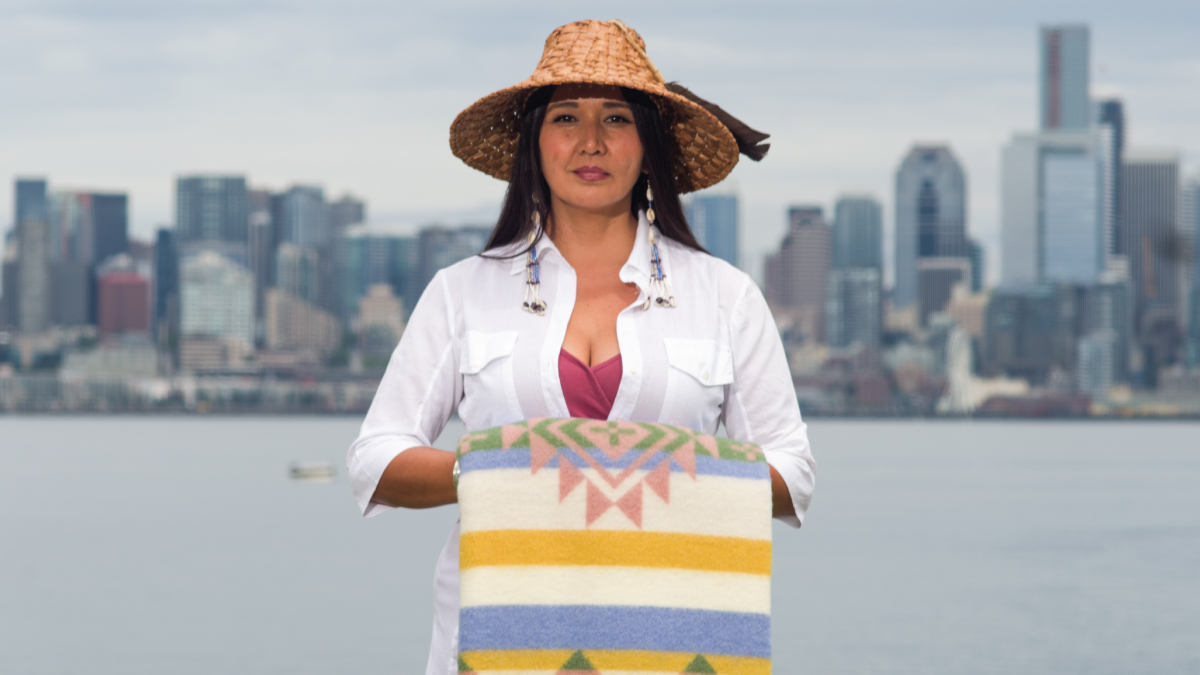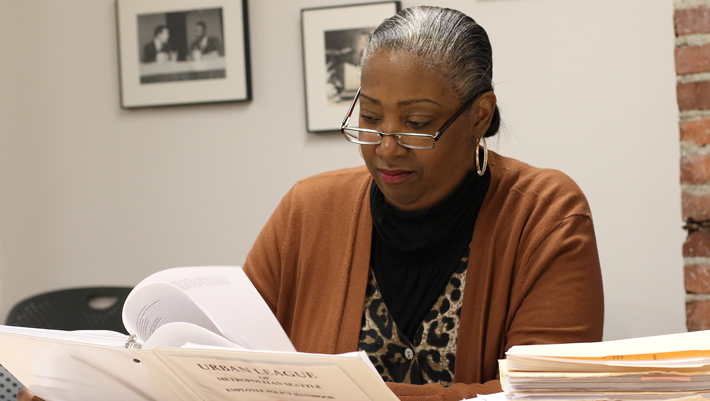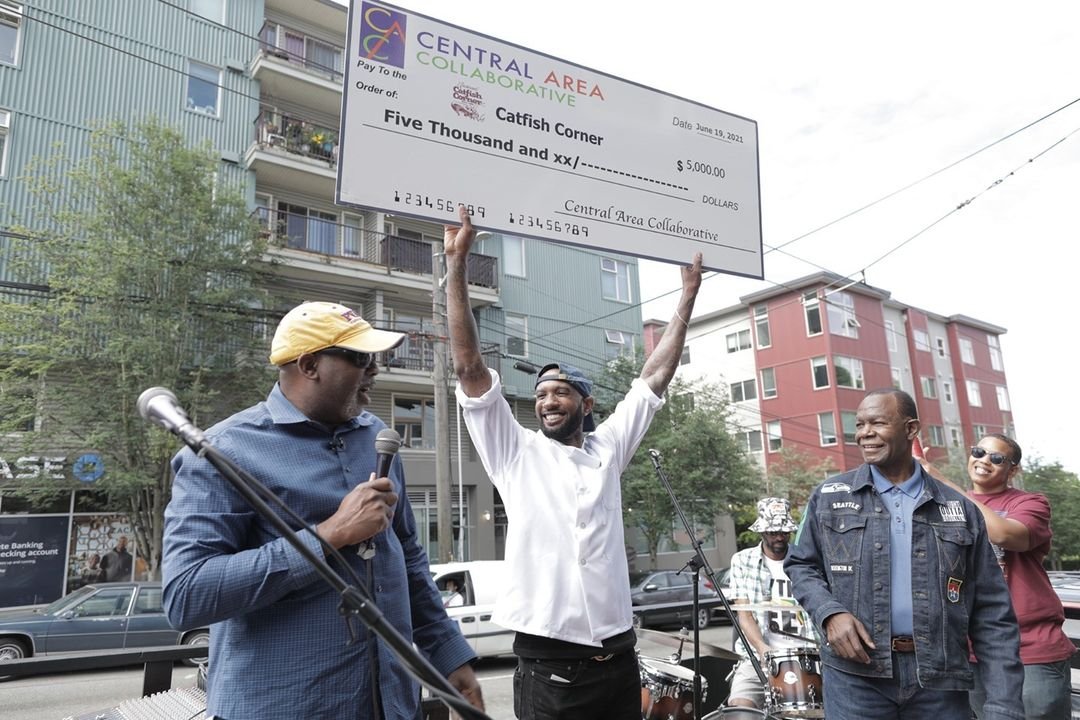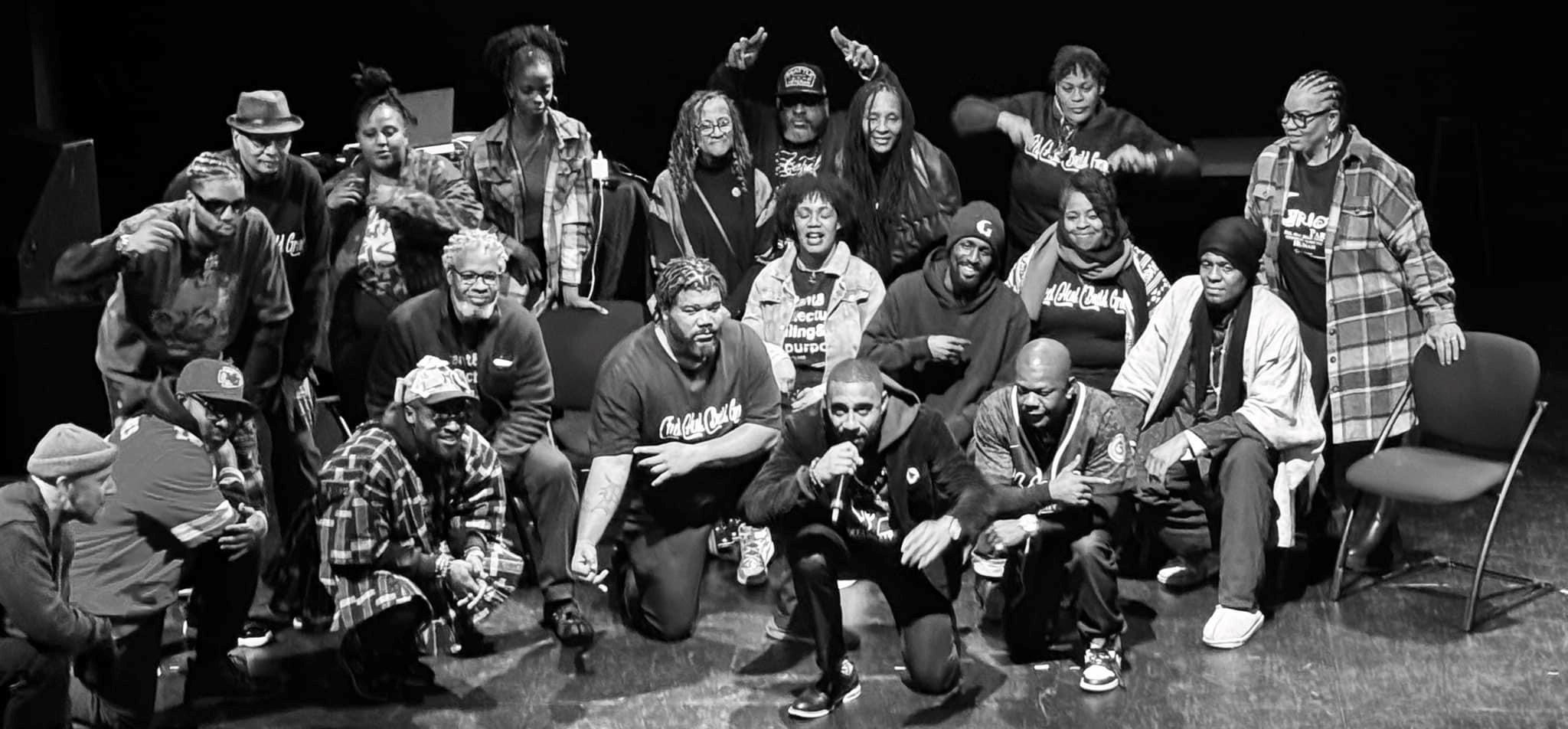 Sondra Segundo (Photo: Mel Ponder Photography)
Sondra Segundo (Photo: Mel Ponder Photography) In celebration of Indigenous Peoples’ Day, we are hosting this series of profiles to recognize local Indigenous leaders, artists, activists, and organizations. The groups and individuals featured in this series have dedicated their work to supporting Native American communities and commemorating Indigenous peoples, cultures, and histories in the area and across the nation.
SONDRA SEGUNDO
Sondra Segundo is a singer of her Alaskan Haida language. She is a published author/illustrator of two Indigenous children’s books Killer Whale Eyes and Lovebirds: The True Story of Raven and Eagle. She is an educator and has worked in schools and programs throughout the Northwest, teaching culture and art and sharing her stories and songs.
Sondra grew up singing both traditional Haida songs with her Elders and gospel music in a South Seattle choir. She brings both worlds together while singing female lead with tribal band Khu.éex’. The band is currently working on a new album that will feature 4 original compositions by Sondra.
Sondra also founded the Haida Roots Language & Youth Arts Program, a grassroots, non-profit organization that creates space for Seattle based Haida to create new songs, books, and curriculum and practice their traditional art-forms. Together they are re-learning their critically endangered Xáad kíl (Haida language) through structured programs and online classes taught by local elders, artists, and teachers.
Learn more about Sondra in our brief Q & A below:
What does Indigenous Peoples’ Day mean to you and how would you like the City to honor this day in the future?
Indigenous Peoples’ Day is a day where we can freely celebrate our diverse tribal cultures. Indigenous voices are finally being heard. It is a day where friends from all cultures now celebrate with us! This is significant because, in the past, our elders celebrated and taught us our culture behind closed doors and in safe places. This was because this government made it against the law to be Indigenous, which resulted in severe racist acts against our people, such as stealing our ancient lands and our babies away from us, punishing our children for speaking our language, and arresting and killing us just for being Indigenous. We can never forget these atrocities. We can only continue to heal ourselves and continue on the same path as our Elders in fighting for our human rights.
Honoring and celebrating Indigenous Peoples’ Day/Week is one way to make things right. Dismantling racist systems is a better way to honor not just the Indigenous, but all people.
How have the incidents of the last seven months impacted you, your community, and/or your work?
It seems many things are trying to steal our breath away in 2020: COVID, the police, wildfire smoke, pollution. The next generation rises and they are deeply upset at the continued colonizer-taught mentalities. They are passionate warriors for justice! They are out in the streets protesting police brutality and more. They are picking up where their elders left off. We pass our stories on to them.
Our non-profit, the Haida Roots Language and Youth Arts Program was going strong until COVID hit. We had to cancel our traditional regalia making classes taught by local elders and we tried doing online Haida Language classes for a bit. In response to our meetings being cancelled, we started a YouTube channel featuring videos of our precious elder, Jane, teaching us phrases in our Haida language.
We are now working on a Haida Home Immersion Space curriculum. We’ve also been building a Haida language program with Seattle Public Schools’ World Language and Native Education Departments, where students can take Haida Language classes and earn up to 4 credits!
As the founder and director of Haida Roots, I am definitely more busy than I was before COVID. And, as an individual artist, many programs are asking me to share culture, stories, and songs online, which I love! But, I was getting burned out and some days could not even get out of bed. My eyes hurt from being on screens so much. I found doing morning prayer and yoga and cooking with my family helped bring me peace and rest. Getting back in the studio to record new songs with our band also brought a deep healing that I didn’t even realize was needed. I’m still trying to find balance with it all.
What are you doing to find joy or solace?
I’m realizing self care is important to find balance and joy. Singing brings me joy. To build my confidence as a Haida Language speaker/teacher, I’ve been taking classes 3 days a week to work individually with my mentor and fluent speakers. Soon I’ll be ready to open Haida Language classes to the Seattle Alaska Native youth/community!
This crisis has given us all the opportunity to reimagine our collective future. If you could reimagine the City of Seattle, what would it look like?
I’ve worked in Seattle schools for many years and I’ve witnessed with my own eyes the school-to-prison pipeline. I see that South Seattle schools are overcrowded and underfunded and that many schools are still very segregated. Middle and high school teachers are given 100 or more students to manage. This takes away from the relationship building and the help each student needs. Many of our youth fall through the cracks. During this pandemic is a great time for our parents (every culture represented) and leaders to go back to the drawing board to reinvent our schools from the ground up…to build schools that are more community based and equitable and celebrate our many languages and cultures.
Name a local Indigenous individual or organization that Seattle should know more about.
I want to honor local Haida Elder Jane Kristovich. She is the most proficient speaker of our Northern dialect living in the world today. She is an inspiration to so many and continues to love us and teach us our precious Haida language. I also want to honor local Haida Elder Joyce Alexander for teaching us about our clans, crests, and language, and Haida Elder Jeanne Jimenez for teaching us our stories, songs, and language. All of these precious elders helped us to build the Haida Roots program.
I also want everyone to know about an amazing woman and friend, Roxanne White. She has been working hard for the Missing and Murdered Indigenous Woman in our area and beyond. Her powerful voice brings awareness to this serious issue at local protests, marches and in the media. She goes to police stations and demands they look for these missing women. She has helped many find their loved ones, including a good friend of mine. Her work is a work of passion and love and it shows. She was recently featured in a Seattle Times docuseries NOT INVISIBLE, Confronting a crisis of violence against Native women.
Learn more about Sondra at her website: sondrasegundo.com/.


